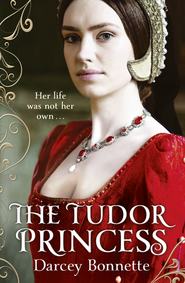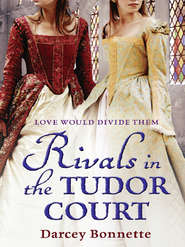По всем вопросам обращайтесь на: info@litportal.ru
(©) 2003-2025.
✖
Betrayal in the Tudor Court
Настройки чтения
Размер шрифта
Высота строк
Поля
“But we’re expected to go down soon,” Cecily returned.
“I said send for him!” she cried as the child retreated. Mirabella was agitated with the little girl. As sweet as she was, Mirabella lost patience with her even, affable attitude. She was so accepting, so content. Why could Mirabella not be content? Why could she not accept the life her parents would no doubt choose for her? It was exhausting, this constant fighting.
Yet it was a compulsion. It was as natural to her as breathing, as eating. She needed to fight. She would serve her Lord. She would not get caught up in these trappings. She would escape. And once free, she would learn contentment, acceptance. She would have what Cecily had.
“Lady Mirabella.”
Mirabella turned to find Father Alec standing in the doorway of the nursery. He filled it up with his presence. Her heart clenched. She did not understand the feelings that stirred in her belly whenever she was in his presence. Perhaps it was his youth; at twenty-eight, Father Alec possessed an allure that was undeniably attractive. His well-muscled build seemed inconsistent with his calling; Mirabella could imagine him in a suit of armour or the finery of a courtier—imagine how hose would hug his legs … oh, what was she thinking? Mirabella squeezed her eyes shut, reopening them to find Father Alec bedecked in the humble robes of a priest. She lowered her head, feeling as though it were a sin just to look at him, as though somehow he would know she had involuntarily imagined him without his robes or a suit of armour or courtier’s finery for that matter.
“Father, I need to confess,” she said.
“You just confessed this morning, my child,” Father Alec told her in his ever-patient tone. “What could have possibly transpired within the last three hours?”
“I have been vain,” she said miserably. “I looked in the glass and saw … I saw that I was … well, I thought I—”
“That you were beautiful?” Father Alec asked, his lips twisting into a gentle grin.
Hot tears stung Mirabella’s eyes.
“Lady Mirabella,” Father Alec cooed as he held out his hands. Mirabella took them, trembling at the heat of his palms. “It is not vain to acknowledge your beauty. By recognising it, you can demonstrate your gratitude to God for bestowing it upon you. I hardly think you will become as Narcissus, my dear.”
“But nuns do not need to be beautiful,” Mirabella said.
“Why? Don’t they deserve beauty as much as anyone else?” Father Alec asked with a slight chuckle. “God made everyone beautiful, for His pleasure. It is not vain to appreciate it. Are flowers vain? Is a sunset vain?” He shook his head. “No, Lady Mirabella. They just are. Do you remember how God referred to Himself as I am? It is the same with the beauty He created. Beauty is. Do you see? Be, my girl. Just be. And find contentment in it.”
Contentment. That word. It seemed so elusive here. Why was it she could only glimpse it at the abbey?
“It is hard to be at this celebration,” Mirabella said. “It just is not who I am, Father.”
“I know that,” Father Alec said. “But you will find that in life there will be many occasions that are not tailored for you. We have to adapt to our circumstances; in adapting, but not yielding ourselves over completely, we can retain our true selves and endure the rest. Can you do that?”
Mirabella considered. Then nodded. “Yes,” she said as she realised how simple he made things sound, how easy it could be. She did not have to like what was going on around her; she only had to be. She could exist in this world and be happy without conforming to it so long as she remained true to herself, to her Lord. “Yes,” she said, brightening. “I believe I can.”
Father Alec proffered his arm. “Good, then. Now. Let’s go down and forget this nonsense about confessing. Save me a real sin.”
Mirabella laughed before she could help herself and allowed herself to be escorted on the arm of Father Alec to the entertainment.
She murmured a little prayer thanking God for him.
No one understood her like he did.
The May Day revels were held out of doors in the garden under an elaborate tent strung with lanterns. Lilies and roses were entwined about all the supports and a wooden floor had been constructed special so that none of the dancers’ slippers would be spoiled by the grass. A table laden with the finest foods was set up; trays of pheasant, prawns, cheeses, breads, stuffed capons, and comfits assailed the guests with their aromas and any number of people could be seen nibbling throughout the evening.
Ladies in golden masks danced in gauzy white gowns trimmed with green to the assembly of musicians who entertained the guests, who were all dressed in their spring best. The dancers’ costumes were indeed quite revealing, baring their creamy shoulders and arms, which were encircled in gold bracelets.
Grace was pleased with the children this evening. Little Cecily was dressed to match Brey in the blue ensemble Grace had designed with her. Grace watched with fondness as the little baroness rubbed the cool satin sleeve against her cheek. She and Brey made the perfect pair. Grace’s heart contracted with wistful delight. Even Mirabella seemed happier than usual. She could not imagine what inspired the child to cooperate. Whatever it was, may it only continue!
Head tingling with the warmth of good wine, Grace threw herself into dancing till the soles of her feet throbbed and ached. When it came time for the ladies to unmask, Grace revealed herself to be one of the bare-armed dancers! Lord Hal’s eyes widened in mock astonishment as he toasted his wife.
“You are full of surprises,” he told her, drawing her close.
“I have to keep up,” Grace answered before she could stop herself.
Hal’s eyes lit with sadness. He averted his head. “You’ve outdone yourself.”
Grace squeezed his hand. “Thank you, Hal,” she said in gentle tones. “Isn’t Brey charming? Look at him dancing with little Cecily and the others. They are splendid together. She’s such a dear child.”
“Indeed,” Hal returned, his face soft as he regarded the children. “And Mirabella. Your choice of gown was exquisite. I have never seen such a stunning creature.”
Grace stiffened. “No, I suppose not,” she said blandly.
From across the tent she eyed her decanter of wine. She began to pull away.
“Grace, please, I didn’t mean—” Hal attempted to seize her hand, but Grace jerked away from him like a horse gone skittish. “Grace. Don’t.”
“What?” she asked him. “Have I not the right to enjoy my own revels?” She sauntered toward the table, lifted the decanter, and held it to her lips. At once a collective thrill of murmuring was heard among the gathering.
Grace had forgotten to use a cup.
It did not matter to her. Face flushed in a mingling of rage and embarrassment, she tilted it back and drank. And drank. Her throat burned, her gut ached.
Still she drank. She would drink till it went away.
But it would come back, in spite of everything; it always came back.
Cecily watched the night unfold in frightened fascination. It had all been so magical at first—the golden hue of the lanterns playing off the masked ladies, the gauzy costumes that clung to their forms so rounded and splendid, capturing the very essence of spring and fertility, all those things that were woman.
The food had been delicious. Cecily and Brey had stuffed themselves, then hid under the table afterwards to play with the pile of caterpillars they had collected throughout the evening and feed them crumbs. The children were hoping to build a house for them to keep in the nursery that they might watch the caterpillars’ transformation.
Even Mirabella was having a good time. She danced, favouring the guests with her rare smile that was a transformation as stunning as that of the caterpillars, which Cecily and Brey anticipated with such eagerness. Her solemn, earnest face was made radiant with that smile, her eyes shone like emeralds, infecting Cecily with the need to laugh. She was thrilled to see her so happy.
Then something went terribly wrong.
The ladies unmasked, revealing Lady Grace to be the lead dancer. This in itself was a thrilling display and Cecily clapped at the sight. The countess was beautiful, as intoxicating as a faery with her white-blond hair falling around her shoulders in ringlets made limp from the dew of evening.
When she took to Lord Hal’s side, the night that had begun as a fantasy faded into a horrific charade. Words were exchanged; Lady Grace pulled away. She strode toward the high table, seized a decanter of wine, and drank straight from it.
This was not unusual to Cecily. She had seen Lady Grace do it many times. But she knew it was not something Lady Grace would ever do in public. It was forbidden. It was unseemly.
Cecily and Brey had been searching out more caterpillars and heard the murmurs of the guests—unkind, snide remarks muttered with cackles of laughter.
People liked to see such things, Cecily realised with a heavy heart. She could not imagine such a display bringing pleasure to anyone. Yet they laughed.
“Why feign surprise?” one gentleman could be heard saying as Cecily and Brey returned to their spot beneath the table. “We know the woman cherishes her wine above all else.”
Brey’s lip began to quiver.
Cecily’s cheeks flushed in anger. How dare they criticise the hostess while they stand at her table and make pigs of themselves! They probably drink out of wine decanters all the time!








